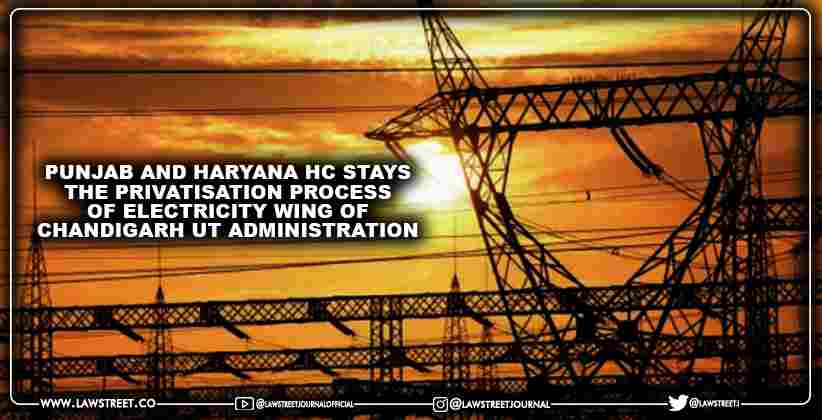The Punjab and Haryana High Court on Friday (28/05/2021) stayed the privatisation process of the Electricity wing of Chandigarh Union Territory Administration.
The matter (UT Powermen Union, Chandigarh (Regd.) Vs Union of India and Others) was heard by a bench comprising Justices Jitendra Chauhan and Vivek Puri through video-conferencing.
The matter first came up for hearing before the Court on 1st December 2020. The petitioners challenged the proposed plan of the Central Government to sell off 100% stakes of the Union Territory Administration's Electricity wing. The petitioners contended that the provisions of the Electricity Act, 2003, does not allow for a 100% transfer of shares, with no control of the government, of the power utility. It was also contended that all the stakeholders like the Governments of Punjab and Haryana and the Union Territory of Chandigarh were not taken into consideration before the decision to privatise the Electricity Wing. The petitioners also submitted that the Electricity Wing is a profit-making entity with a good track record.
Recognising the need for a detailed hearing on the matter, the Court posted the matter to be taken up after the Court reopens in six months. The Court stayed the operation of a government notification seeking bids till the next hearing of the matter.
Aggrieved by this order, the Central Government has moved the Supreme Court with a Special Leave Petition, but the Court upheld the High Court order and directed the High Court to dispose of the matter expeditiously.
This time the matter came up for hearing by way of a special mention challenging a communication by Special Secretary Engineering, Union Territory of Chandigarh to M/s Deloitte Touche Tohmatsu India LLP, Gurgaon, the Transaction Advisor for the privatisation process, instructing the latter that the process of privatisation in Chandigarh is required to be kept on a fast track.
Senior Advocate C.K. Chopra appearing for the petitioners, pointed out that the petitioners had already requested the government not to move ahead with the privatisation process considering the importance of uninterrupted electricity supply in the fight against Covid-19 infections. It was also submitted that the employees of the Electricity Wing are Covid-19 frontline warriors. The Senior Advocate also argued that any step taken towards privatisation without final disposal of the pending litigation would only cause further delay and costs.
The Central Government, in its reply, submitted that it was not acting in violation of the previous order of the Court and that the fears of the petitioners are unnecessary.
After hearing the parties, the Court elaborated on the importance of public sector enterprises to the concept of 'Atamnirbhar Bharat'. The Court observed that:
If the argument on behalf of the respondents is to make India 'Atamnirbhar Bharat', we are at a loss to understand that what can be more 'Atamnirbhar' than an institution made in India, by Indians, operationalised by Indians, creating jobs for Indians and enriching the Indian State with its profits. We also feel that the idea establishing such wings is an egalitarian one with the aim to include those sections of society that need a helping hand. The philosophy of inclusion, as envisaged by Dr. Ambedkar in the Preamble, also included the concept of 'Economic Justice'.
The Court also observed that privatisation is not a panacea for all ills. The argument of efficiency cannot be taken in this case as the Electricity Wing is profit-making.
The court order that the letter of the Special Secretary Engineering, Union Territory of Chandigarh should also be kept in abeyance until the further hearing of the matter on 18th August 2021.








